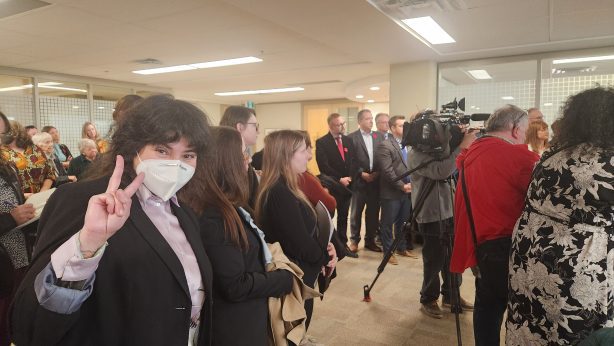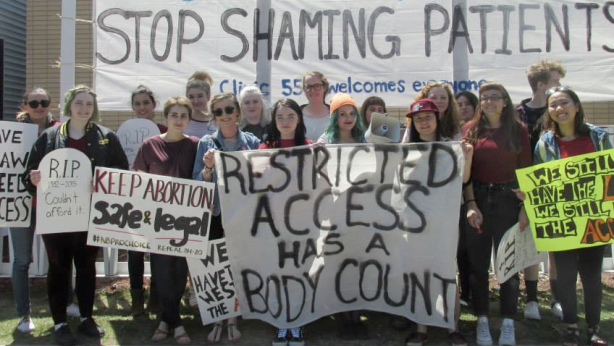Canadians respond to devastating abortion rights rollback in the U.S.
On June 24, the Supreme Court of the United States overturned Roe v. Wade, a landmark ruling made almost fifty years ago that ensured the constitutional right to access safe and legal abortion care.
“While there is still much work to do here in Canada, we remain committed in our solidarity to all advocates and activists continuing the fight for bodily autonomy and gender justice, in the United States and around the world.”
BEA BRUSKE, PRESIDENT OF THE CANADIAN LABOUR CONGRESS
To be clear, the overturning of Roe v. Wade has and will not stop abortions in the U.S. It has only made it more difficult and more unsafe for people in America to have an abortion and to provide abortion services.
Bea Bruske, President of the Canadian Labour Congress, a member of the Canadian Health Coalition, responded: “Access to safe, legal abortion is a fundamental human right that must be guaranteed to everyone and should not be a privilege related to the colour of your skin, where you live or how much money you have. Taking away peoples’ reproductive health and rights is wrong and will inevitably impact poor and racialized communities the most.”
Bruske continued: “Abortion bans do not stop abortion. They only make abortions harder to access and more dangerous, particularly for communities who are already marginalized. The World Health Organization estimates that 25 million unsafe abortions take place each year, and identifies that the lack of safe, respectful, timely abortion care services is a critical public health issue and leading cause for maternal deaths and morbidities world-wide.”
Nicole O’Byrne, an associate professor of law at the University of New Brunswick, told the audience gathered at the Canadian Health Coalition’s webinar marking 60 years of Medicare on Monday, June 27 that the federal government is not enforcing the Canada Health Act and that’s apparent with reproductive health care in New Brunswick.
“Clinic 554 has made national media more times than I count. It’s now closed. But, we’re supposed to have access to services. It should be portable, it should be universal, it should be comprehensive and the provincial government here has violated the Canada Health Act,” said O’Byrne.
Clinic 554 opened in Fredericton upon the closure of the Morgentaler Clinic in 2015. The only abortion provider in the province’s capital city, Clinic 554 was forced to stop most of its health care services last year. The award-winning clinic provided not only abortions but also health care for trans and gender-variant residents across the Maritimes. In 2019, Interpares, a Canadian Health Coalition member, awarded Clinic 554 with its Peter Gillespie Social Justice Award.
Clinic 554 and Reproductive Justice New Brunswick have long fought to have a regulation axed that stopped Medicare-funded abortions in non-hospital settings.
Clinic 554, recently sold, blamed the regulation for its inability to stay open and provide abortions. The Canadian Civil Liberties Association is challenging the regulation in court.
New Brunswick is not the only region in Canada experiencing barriers to abortion services.
Bruske summarized the barriers to abortion access in Canada: “While abortion is decriminalized in Canada, barriers to accessing this essential health service persist. These barriers include a lack of accurate information, travel and other costs associated with accessing care, wait times, and gestational limits. These barriers disproportionately impact low-income, young, newcomer and racialized populations, as well as people with disabilities, and those living in rural and remote communities.”
Abortion access advocates from across Canada are standing in solidarity with people in the U.S. who now face more difficulties accessing abortion services while also pointing out the lack of access at home. Protests against the overturning of Roe v. Wade happened last weekend in Halifax and more are planned in Fredericton and elsewhere.
Abortion Rights Coalition of Canada, Action Canada for Sexual Health and Rights, and Amnesty International Canada have released statements of solidarity and petitions demanding that abortion rights be secured.
CLC’s Bruske said, “While there is still much work to do here in Canada, we remain committed in our solidarity to all advocates and activists continuing the fight for bodily autonomy and gender justice, in the United States and around the world.”
Photo: For three decades, abortion rights activists in New Brunswick have been calling for the repeal of Regulation 84.20 Schedule 2.a(1) that restricts abortions to hospital settings. Photo by Sophie M. Lavoie/NB Media Co-op.


